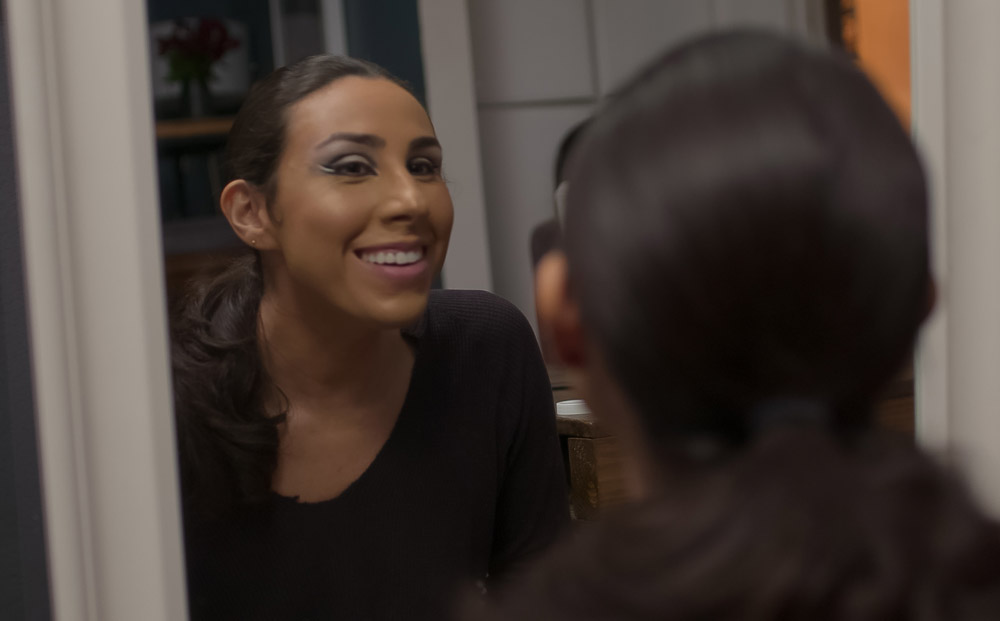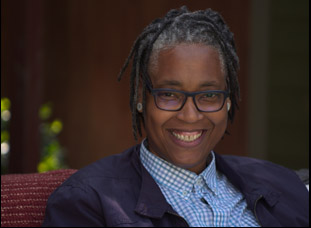There had to be some mixed feelings when Julie Cohen came across an interview with David Reimer in the NBC News archives for an episode of Dateline that caused a stir when it was first aired in 1996, yet isn’t all that well-remembered today, not even to those who continue to struggle with the same issues he did after a mishandled circumcision left him without a penis and his parents made the difficult decision to raise him as a girl shortly after his birth in 1965. Even if he wasn’t told about his natural gender until much later, he was disoriented by having sexual reassignment surgery before he was old enough to consent to it and identifying as female as much as his parents thought it was the most conscientious decision at the time, and Reimer, who ultimately took his life when he was 38, thought by sharing his story that it might prevent others from experiencing the dysphoria he did.
Cohen likely wouldn’t have made “Every Body” if Reimer’s story was better known, but after co-directing “My Name is Pauli Murray” with Betsy West, highlighting the profound influence of the nonbinary legal scholar on a number of far more famous people such as another one of Cohen’s subjects in Ruth Bader Ginsburg, she’s well-aware that some of the most relevant stories for today can be found in the past and with her latest film, the fact that so little about the intersex community is known makes it revelatory. The interview with Reimer actually arrives as something of a surprise for Sean Saifa Wall, Alicia Roth Weigel, and River Gallo, the three subjects that Cohen follows in the present day as they aim to raise awareness about their gender orientation as people born with different sex organs than the rest of their bodies might suggest and as they take a break from their current activism to watch the Dateline episode, they may be unaware of Reimer’s specific story, but can certainly relate to the difficulty of speaking up publicly about something that might not only be considered shameful by some but complicated to explain.
“Every Body” alleviates all of those concerns as Wall, Weigel and Gallo all speak confidently about the journeys that led them to where they are now, though their lives weren’t made any easier by either how little they knew about their own condition growing up or that others were in the same situation and their openness now seems to be a product of more and more coming forward. Cohen captures momentum building for a movement towards greater protections for intersex children to determine what’s ultimately in their best interests once they’re of age, but also witnesses how in sharing personal stories, the intersex community has offered each other support than hasn’t been there from the medical establishment where few besides Dr. John Money, who was consulted for Reimer’s surgery, looked into the area for serious scientific study. When profiling a trio living out loud, the film has a celebratory feel from start to finish, where Cohen finds a unique way in the end credits to honor the legions of people who came together to make it possible, and following a recent premiere at Tribeca, “Every Body” is opening in theaters across the country. The director spoke about how a new generation is breaking a cycle of silence, how she was able to connect the past to the present and the film’s savvy use of music to tell a story in and of itself.
This came about from NBC News Studios, and I was a producer at Dateline a long, long time ago, but I’ve actually come back and done some development work for them from time to time and they asked me to come back in 2018 to look through their fantastic archives for stories that might be jumping off points for documentaries. That historical story [about David Reimer] that shows up in the middle of this film dates back to the 1960s Dateline had covered in the ’90s, and I [thought], “Wow, that’s an amazing story. How does it relate to things going on today?” That led me to research both the connection to intersex treatment and the amazing blossoming intersex rights movement, [which I find] tremendously interesting and just a scandalously undercovered story. I think people have shied away from it because it’s unfamiliar and complicated, and also because intersex people themselves have been kept from talking about their own lives or had their own medical histories kept secret from them. It’s been harder for people to talk, but more and more are starting to learn their own stories and speak out and that’s what made this film possible.
How did you find your three subjects?
Google. [laughs] Truthfully, as a doc filmmaker, the internet is your friend. People are putting not only words and stories out there, but also video of themselves and you can find some pretty amazing stuff. I had a strong sense that I wanted the people in the film whose lives you’re following to organically be connected to each other, so they didn’t feel like you were being jerked around from story to story. You could see them in action together. So I connected with Alicia early on in the development process, and she was incredible. And Alicia introduced me to Saifa — these were people that were already friends and already working together, and then when we were filming that poster-making scene, River just showed up and lit up the camera and I was like, “Wow, they’re amazing.” I didn’t even know River was an actor at that point. And when we talk about diversity, we usually end up talking about race, but the diversity of kinds of activism was important here and styles of human beings and how they’ve dealt with challenges that they’ve had in life — I wanted them to feel different in every way.
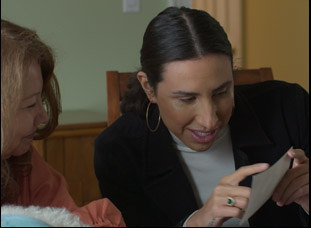
Initially, I had thought of this as something that was going to be weaving together history and the [present day], but truthfully, the modern-day people that are in the film were so incredible and richly complicated, so [we] needed some time to play out and what was happening with them and the activism they were doing even as we were filming was so great that I really decided that the story should be mostly their story. There was a cut that was structured basically the same, but that the historical part was maybe like a third of the story and people including Shana Knizhnik, who is intersex herself and was our production consultant on this film, and our executives at NBC and at Focus Features were like, “No, cut that down even more. We want to learn that history, but mostly we want to hear from these three incredible young activists who are having so much impact.
And as we started filming with the three lead participants in the film, their stories were so incredible and I [thought], “Okay, we’re actually going to need to start with them and end with them because the historic story comes to its own static end whereas they have a lot of dynamic stuff happening, [so] I decided if I’m going to stick that [David Reimer interview] in the middle, you really need to connect it to them and the best way to do that was just going to be to show them the footage. Of the three, only Saifa really knew much about that story at all as a Ph.D student who studied a lot of intersex stuff and he’s a bit older than the other two. He has been an activist for about 20 years, although he hadn’t seen a lot of the footage, so they’re [all] experiencing it in the same way that the viewer is experiencing it, but maybe a little bit more intensely because they see how this crazy, horrible case of poor judgment has impacted their own lives.
When that choice about what gender to raise intersex children has traditionally been the parents’ decision, how much did you want to engage them? I know River’s mom makes an appearance.
Yeah, parents are part of the story and [we] certainly wanted to include that perspective. Having the [perspective of] more recent parents were also important because it shows how treatment is starting to evolve and get better, like she wasn’t pushed into having surgery for her child in the way that [David Reimer]’s parents had been pushed only 30 years ago, so that’s some progress. But in the end, this is the young people’s story themselves, not their parents’ stories. I think they’ve been frustrated in the past that when people talk about having an intersex baby, everyone’s like keep the parents happy. But of course, when you’re grown up and you’re an adult, you might not be so down with the decisions that your parents made for you without that much education on the subject. None of these three young people would have chosen what their parents chose, although all three of them were notable in their empathy towards their parents’ decisions, even if it caused some problems in their relationships, and even if it’s not the decision they would have made. In the end, River’s grace towards their mom is, to me, the most beautiful part of the story because they do have an incredibly beautiful relationship, even though I think River has some frustration. And actually River and their mom are going to be at the premiere at Tribeca, so I’m very excited to see how [they] respond to seeing the film.
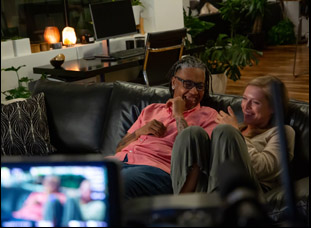
This subject matter, for so many of us, is full of surprises. Certainly, River’s mom’s willingness to talk with us and how she responded felt surprising. River getting cast in a Shakespeare play in the middle of things, I wasn’t really expecting that to happen. I [thought] we definitely have to film a rehearsal for that. Obviously when you’re filming a protest, you don’t really know what to expect, and you’re telling people, we’re just trying to tag along with you for periods here and there. My favorite one of all actually was the museum in Berlin when Saifa happened to mention to me, “Oh, there’s some nude photos of me that are going to be in this really cool art exhibit in Berlin and I’m not sure I’m going to go or not.” And I’m like, “Oh, let’s go to Berlin together.” That was a really fun trip, but also a really emotional experience to see Saifa, who had been raised to think of his body as something secret and shameful being presented as a a work of art that people would come to see in a museum, so that was surprising and beautiful.
A really lovely touch was the gender-swapped cover songs in the film’s soundtrack. How did you decide on that?
I’m a big music person and I really like to have pop music in documentaries. It’s part of the process of making them feel like you’re really watching a movie and making it feel enjoyable, not like you’re being educated, but to make the whole experience feel fun. And it just seemed like if we’re going to use these great pop songs, it needs to be not straightforward and to remind us our gender expectations aren’t what make a great song great. I particularly love Amy MacDonald, a Scottish woman who sings Bruce Springsteen’s “Born to Run,” which was a song we really wanted in the film because River specifically describes how much Bruce Springsteen means to them as a Jersey girl, as River calls themselves, and things had to shift over time as you’re trying to get the rights to use music. I’m just eternally grateful for some of the huge stars such as Bruce Springsteen and Lizzo allowed us to use covers of their songs and we went to quite a lot of trouble to make sure we were finding really, really good covers so that it wouldn’t be an insult to the song. Obviously it’s not the voice you’re expecting, but what [Amy’s] doing is something different and feels like it retains the spirit.
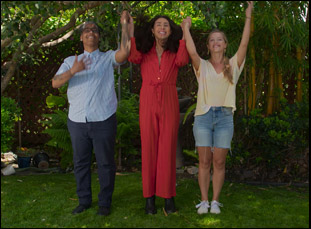
The end credits were like a COVID change. We were going to do a very complicated shoot at a park in Beverly Hills because that was where River was rehearsing [for their play] and we had a three-day shoot scheduled in L.A., but when I showed up, it turned out that River was having a COVID scare, which turned out not to be actually COVID, but we had to redo our whole shoot. And what had been planned as a very complicated closing sequence where you were going to see them hanging out in this big fancy park, instead we were doing this outdoor interview and we weren’t going to have time to go to another location, so I’m like, “Why don’t we just do a static shot and we’ll all just dance back and forth through it?” We had a different song to get us in the mood, but we swapped it out for Lizzo and again, these three young people had so much spirit and that really was the end of filming, so we all knew each other quite well. And on the spot, the crew was mad at me because I made them all go through and take bows — I hadn’t prepared them to do it, but I really hadn’t planned to do it myself. But once we did it, [we thought], “Oh, this is so cute. We’re going to have to go back and shoot our New York crew.” We thought it would be keeping with the whole spirit of the film — unexpectedly joyous, which is was what we were going for.
“Every Body” opens wide on June 30th.




